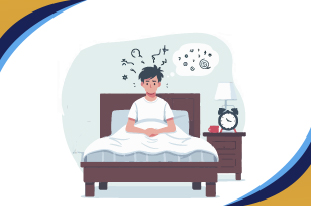ADHD is usually known for causing problems with focus, impulsiveness, and being overly active. But people with ADHD might also have mood swings or feel very happy or sad in a short time. Such changes can vary from extreme happiness to severe sadness without any well-understood reason.
In this blog post, we will examine ADHD mood swings, does ADHD cause mood swings, can ADHD cause mood swings, are mood swings a symptom of ADHD, how to deal with ADHD mood swings, whether ADHD is a mood disorder, and why they occur.
What Are ADHD Mood Swings?
People with ADHD and mood swings often experience sudden and unpredictable mood changes. They might feel happy one minute and angry or sad the next, and they don’t always know why this happens. Such mood shifts can be irritating, not only for the patient himself and fellow workers but also for relatives. They can damage personal relations, impede business activity, and cause burnout.
Example:
Suppose you look forward to getting up each morning feeling happy and looking forward to the day’s events but find yourself moody and aggressive at mid-morning with no apparent reason as to why you should be so. At lunchtime, you may find yourself full of energy, but by dinnertime, you are full of anxiety. Such fluctuations of feelings can leave the individual feeling weary and bewildered.
Read More: ADHD vs Depression: Finding The Link Between Them
Causes of ADHD Mood Swings
There is no single cause of ADHD mood swings but a combination of the following:
- Neurochemistry and Dysregulation
It is associated with neurotransmitters, including dopamine and norepinephrine, essential in controlling mood and attention in individuals. These neurotransmitters relay signals in the brain that influence concentration, drive, and reward. When off-balance, moods can change quickly, leading to mood swings.
- Emotional Dysregulation
Being under control of emotions is a severe issue in patients with ADHD. It is defined as a person regulating their emotions when responding to different stimuli. People with ADHD might react strongly to small things, like getting very upset or excited over minor mistakes. It can be challenging to control their emotions, and their moods can change quickly.
- Rejection Sensitivity Dysphoria or Simply Sensitivity to Rejection
Another thing with ADHD is that the majority of them suffer from Rejection Sensitivity Dysphoria (RSD), which is an enhanced reaction to perceived rejection. In this, the patient may quickly sift through emotions like anger, sadness, or a feeling of worthlessness if provoked when there is no intention to reject or criticize. This increased awareness is a significant component of ADHD and adds to the propensity for mood dysregulation.
- Factors associated with their environment and lifestyles
Although mood swings are part of ADHD, some factors may worsen them within a short period. These factors include stress, inability to sleep, poor or unhealthy diet, and excessive stimulation from noisy and chaotic environments. Some internal stimuli may flood the brain with signals that ordinarily enhance the mood and cause more frequent mood changes.
How ADHD Mood Swings Affect Daily Life
Mood swings can have a significant impact on various aspects of an individual’s life:
- Relationships: Emotional instability can trouble the people around you, your friends and family, or even a partner. ADHD patients might tend to misinterpret the feelings and intentions of their partners or find themselves arguing. Families may be constantly anxious or worried to see how the person with ADHD is going to respond next.
- Work and School Performance: As suggested earlier, mood fluctuations will likely affect attention and productivity. A person may wake up with a good attitude and be productive throughout the day, only to get interrupted or bored once they are in another mood. This can make it hard to stay focused and finish tasks on time.
- Self-Esteem: ADHD patients may suffer from fluctuations in emotions and gradually lose self-esteem when they experience episodes where they explicitly realize they are overemotional. They may start to develop these feelings about themselves and take on labels such as ‘emotional,’ ‘broken,’ or other labels, which can lead to anxiety or depression.
Managing ADHD Mood Swings: Practical Strategies
Although persons with ADHD know that their emotions change from one extreme to another, they can always find ways to mimic how they handle their changed moods.

- Mindfulness and emotional awareness
Most experts agree that to gain control over mood swings, one needs to learn to be more emotionally intelligent. Mindfulness techniques that are prescriptive or may involve meditation, deep breathing, or journaling help an individual learn signs that depict a change in mood. If they recognize these triggers at their getting phase, they can avoid getting carried away by their emotions.
Tip:
Some time should be devoted to mindfulness meditation every few days. Concentrate on your breath, and don’t judge your thoughts and feelings. This can help you develop emotional strength over time.
- Routine and Structure
Making a schedule and maintaining stability can be overwhelming when the patient is emotionally distressed. Sufferers should learn regularity, as time for sleep, meals, exercises, and rest stabilizes their emotions. Lack of structure and order triggers mood fluctuations, and therefore, structure can be beneficial for ADHD patients.
- Cognitive Behavioral Therapy (CBT)
CBT is structured and is one of the best-recommended treatments that exist to treat people with ADHD to assist them with better management of emotions. CBT is a technique that works to enable a person to recognize negative thoughts that cause problems with mood regulation. It becomes beneficial when these thoughts are changed and replaced with more acceptable ways of dealing with stress to decrease the extreme highs and lows of mood swings.
Example:
An individual suffering from ADHD might learn to understand that their impulsive temper means that their thoughts are distorted (for instance, thinking, “I am always wrong,” when one judge is wrong) and replace it with rational, less extreme thinking.
- Psychiatric Medication
In some cases, the patient may have to take medication since mood swings are also a symptom of ADHD. Psychiatric medicines act to balance neurotransmitters and can help people maintain a stable mood. Coordinating with a doctor to discover what form of treatment that includes physical therapy and medication is needed for long term healing is crucial.
- Self-care program and stress management program
Stress management is essential to human emotions. Practical self-care, including daily schedules that include exercise, leisure activities, and social interactions, tends to decrease stress and increase mood. Also, other stress causes can be defined before reaching burnout and learning to say no more often in such situations.
Tip:
Include exercises or activities that make you happy and relieve stress in your daily routine. Whether the patient wants to paint, garden, or meet friends, such lessons can help improve the patient’s emotional regime and decrease the risk of mood swings.
Read More: Understanding Episodic Acute Stress: Causes, Symptoms, And Management
Conclusion: Finding Balance in Emotional Waves
Emotional liability is an incredible issue regarding ADHD, although you don’t have to let this control your life. It is, therefore, crucial for individuals with ADHD to learn what causes the change in their mood and how best to deal with it using practices such as practicing mindfulness, therapy, and self-care.
Lastly, do not forget that managing emotional fluctuations with ADHD is quite a slow process and can take lots of encouragement and time. No matter the support of a professional or an individual schedule, managing emotional fluctuations with ADHD is questionable. People can manage their flood fluctuations and lead healthy emotional and mental lives.
























